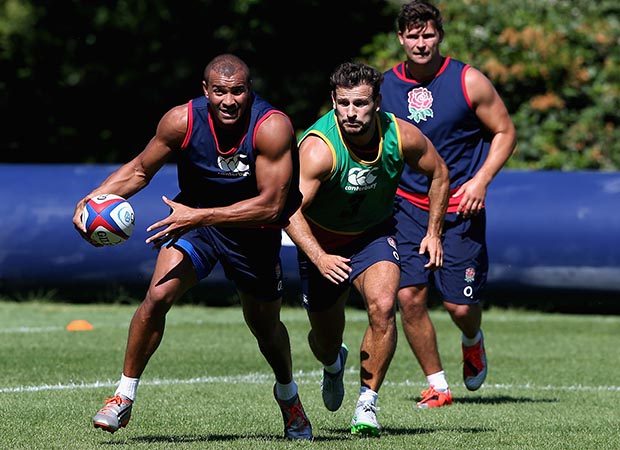 The great upside of getting into England training camp early is that the excitement builds from the minute you arrive at the car park and go through the entrance to the team hotel. It intensifies as you listen to the address from your head coach outlining the challenge ahead, and then the World Cup journey begins.
The great upside of getting into England training camp early is that the excitement builds from the minute you arrive at the car park and go through the entrance to the team hotel. It intensifies as you listen to the address from your head coach outlining the challenge ahead, and then the World Cup journey begins.
In 1995 there were only a few weeks between the end of the English season and going into camp for the World Cup in South Africa. One thing that doesn't change is that there are always players who hold the shirt and are going to start, and that it looks unlikely that the team selection will vary much, if at all, from the team that played in the last Test of the season. That's until the action starts and injuries, or disciplinary issues, come into play.
However, at the start of any camp it is the players in possession who are at the top of the selection process, and the same applies this time with the team that finished the Six Nations in style against France. The coaches will not make a habit of telling players that, but those outside the last match 23 are not stupid. The thing that motivates them is that they have a good chance to show what they can do and state their case – especially as only six will be cut from the initial 50-man group before they leave for the USA.
We have been told by the England coaches that they are looking at how positional rivals get on against each other in training, with tight-head props Dan Cole and David Wilson given as an example. I'd be surprised if Cole didn't surpass Wilson in anaerobic tests, and match him for strength – although Wilson may be able to push more in the gym.
That training method gives the coaches a statistical and conditioning comparison for every player competing for a particular position. However, those stats cannot be allowed to overwhelm and blind coaches to what they see happening in front of them on a rugby field. More important is who gives away more scrum penalties, and who makes more tackles and wins more breakdowns.
I liked the competitive environment as a player, although outwardly I never made out that I did. However, I was pretty focused. I knew that to keep the shirt I had to be in the top five per cent in the sprints stats, do well aerobically, and also be above average in strength and conditioning.
In camp you should know that with hard work you can reach the strength and conditioning goals you are set, and head coach Stuart Lancaster has been clever in planning against staleness by breaking the training regime up in terms of using different locations.
It's good fun, and Pennyhill Park is a home from home for many of the senior pros, who enjoy its familiarity, while the facilities will also be a ‘wow' factor for the young guys coming into the squad.
Lancaster has created an England environment which eclipses most club environments, and the players should treasure it because it is a unique experience which, with hindsight, will pass in the blink of an eye.
It will be London, and then Denver, Colorado, and then all the training will be gone so fast and they will be in a coach entering Twickenham about to face Fiji in the World Cup's opening match. You cannot miss a beat, because it all happens so quickly, just like on a Lions tour.
Throughout the process players will look at themselves, and those around them, and what they bring, and understand where their own deficiencies are and where they have to improve. By now they will have realised that in the pro era you cannot talk yourself into the team – it's all about performance.
The modern day term that reflects how teams like England are run internally is, ‘leadership group'. However, I suspect that the only difference is that it's PC to have a couple of younger inexperienced players in the inner sanctum usually reserved for senior pros. If it settles those younger guys into the group, and they have a voice that can be heard, then overall it's probably the right way to go. Young players can talk more easily to each other than they can to established players who they may be competing with.
From a coaching perspective the hardest thing is not to say the wrong thing to players. For instance, there is always a temptation to tell them that if they get their targets up to this, or that, that they'll be in the squad – and then there's a sense of grievance when they are cut! There used to be a wartime saying that, “loose lips sink ships”, and in a training camp loose lips can have a detrimental effect. Lancaster has been brave and transparent to hold one-on-ones telling players where they are in the pecking order, and because they are private conversations the only potential friction is between a senior pro who is overlooked and the head coach.
If it was me, the thought of going to Denver for two weeks would be mind-blowing. Sure, it will be hard, but it will turn you into the best conditioned, fittest player you have been. Being in the best possible shape you can be in is a great buzz – and if your mental state is the same you will desperate to play in those warm-up matches.
Generally, there are not too many selection shocks going into World Cups outside injuries and disciplinary issues, and the only changes for the first game against France at Twickenham could see Joe Launchbury and Ben Morgan get a run, although there is perhaps a small chance for another winger. The only big surprise would if someone like Tom Youngs or Tom Wood were left out, but I don't see it bar injury.
In the forwards England almost have two complete packs which could do a very similar job. They are are very well matched in most positions, apart from openside, but the picture is different in the backs. While England have similar cover in the back three, the potential combinations in the middle at 9-10-12 are very different.
As I mentioned last week, the first France warm-up has to be the strongest England team, because you want them used to playing alongside each other in match conditions. In my experience it is difficult to replicate those conditions in squad training.
England are under the microscope and it will be intense. A lot rests on what the strength conditioning experts do – and the only time the rest of us will see whether it's worked or not is on the pitch. And that's when their jobs are in the balance.
How different teams are preparing for the tournament is an interesting matrix. I've not heard that New Zealand, South Africa, Australia or Argentina are going to train at altitude, but in most respects their build-up strikes me as ideal.
There are only 16 matches in the regular Super 15 season, and they are about to go into national camps, play a warm-up game like New Zealand are in Samoa, and then prepare for the truncated Rugby Championship. They play three intense Tests each, and then have a short break before going back into camp and arriving in England 10 days before the tournament.
That sounds perfect to me. They will be well-conditioned to the demands of international rugby physically and psychologically, and the waiting will not seem anywhere near as long as it does for the Northern Hemisphere teams.


























